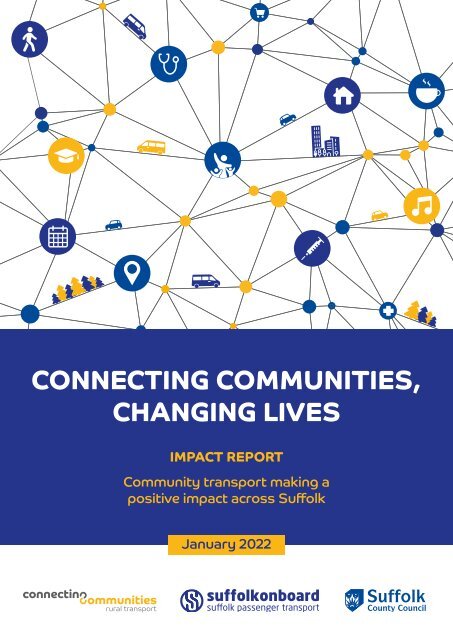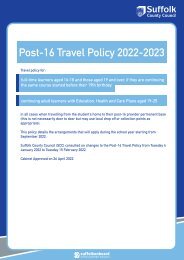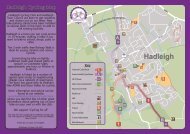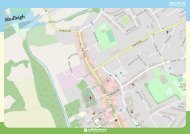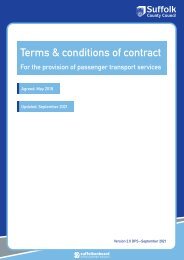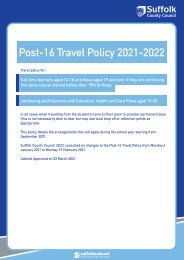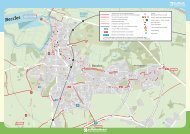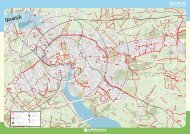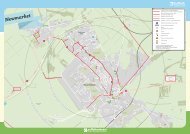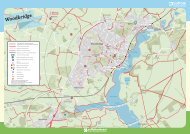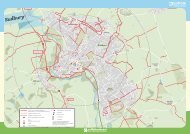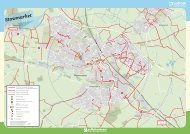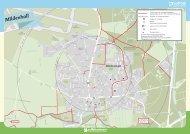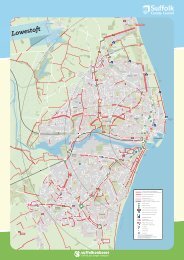Connecting Communities Impact Report
Create successful ePaper yourself
Turn your PDF publications into a flip-book with our unique Google optimized e-Paper software.
CONNECTING COMMUNITIES,<br />
CHANGING LIVES<br />
IMPACT REPORT<br />
Community transport making a<br />
positive impact across Suffolk<br />
January 2022
CONTENTS<br />
3<br />
5<br />
6<br />
9<br />
WELCOME<br />
HOW TO NAVIGATE THIS REPORT<br />
CONNECTING COMMUNITIES AND CHANGING LIVES<br />
OUR IMPACT IN NUMBERS<br />
12<br />
ON THE MAP<br />
13<br />
THE VOLUNTARY NETWORK<br />
CONNECTING COMMUNITIES ACROSS FOREST HEATH AND ST EDMUNDSBURY<br />
CONNECTING TO EMPLOYMENT: TINA’S STORY<br />
18<br />
HADLEIGH COMMUNITY TRANSPORT GROUP<br />
CONNECTING COMMUNITIES ACROSS BABERGH<br />
CONNECTING TO HEALTH CARE: JOY AND ROY’S STORY<br />
24<br />
BSEVC<br />
CONNECTING COMMUNITIES ACROSS<br />
MID SUFFOLK AND IPSWICH<br />
CONNECTING TO EDUCATION: CHLOE’S STORY<br />
30<br />
CATS<br />
CONNECTING COMMUNITIES ACROSS SUFFOLK COASTAL<br />
CONNECTING TO AMENITIES: SHIRLEY’S STORY<br />
36<br />
BACT<br />
CONNECTING COMMUNITIES ACROSS WAVENEY<br />
CONNECTING TO VOLUNTEERS: PAUL’S STORY<br />
42<br />
GET IN TOUCH
WELCOME TO<br />
<strong>Connecting</strong> <strong>Communities</strong>,<br />
Changing Lives.<br />
In this report, through both stories and statistics, we demonstrate the positive impact<br />
that community transport providers are making on people’s lives across the county<br />
of Suffolk.<br />
Together, we tell a powerful story. It’s a story that highlights the challenges faced by<br />
many thousands of people who find it hard to access ‘regular’ transport options. But<br />
it’s also a story about possibility and about partnership – working together to change<br />
people’s lives for the better.<br />
Community transport providers are uniquely placed and uniquely experienced to<br />
deliver services that make life possible for people who would otherwise be isolated at<br />
home. Between us – the organisations featured in this report – we have well over 100<br />
years of experience doing what we do with both commitment and professionalism. We<br />
understand the needs of the people we support, our training and experience is second<br />
to none, and we are deeply rooted in the communities we serve.<br />
During recent years, this work has been made possible by <strong>Connecting</strong> <strong>Communities</strong>,<br />
the transport service provided by Suffolk County Council designed to help people travel<br />
around the county who might not have access to a regular bus service.<br />
<strong>Connecting</strong> <strong>Communities</strong> provides vital funding for many of our services to run. In doing<br />
so, it also enables us – as ‘non profit’ charities and social enterprises – to provide a<br />
range of additional services that help us fulfil our charitable missions for the good of<br />
the people and neighbourhoods we serve.<br />
<strong>Connecting</strong> <strong>Communities</strong> has also supported our own ethos in the community transport<br />
sector to work in partnership with each other, in pursuit of our shared values.<br />
As Suffolk County Council develops its ambition to deliver a sustainable and impactful<br />
bus service for the county, and looks to rejuvenate local transport services under<br />
the National Bus Strategy - Bus Back Better, we look forward to working with our<br />
partners at the council to explore new opportunities, and to ensure that the experience,<br />
commitment, expertise and trust built by community transport providers can continue<br />
to play a crucial role on behalf of people in communities across Suffolk.<br />
Caroline Robinson<br />
Managing Director,<br />
The Voluntary Network<br />
Lynn Butler<br />
Manager, CATS<br />
Debbie Blowers<br />
Manager, Bact<br />
Joy Moran<br />
Manager, Hadleigh Community<br />
Transport Group<br />
Jo Reeder<br />
Chief Executive, BSEVC<br />
3
HOW TO NAVIGATE<br />
THIS REPORT<br />
This report explores the impact of community transport<br />
organisations delivering the <strong>Connecting</strong> <strong>Communities</strong><br />
services across Suffolk.<br />
The first chapter, <strong>Connecting</strong> <strong>Communities</strong> and<br />
Changing Lives, begins with an introduction to<br />
<strong>Connecting</strong> <strong>Communities</strong> itself and an overview of<br />
community transport, its purpose and approach.<br />
The second chapter then explores a range of ‘impact<br />
data’ collected during 2019/20 by the five community<br />
transport organisations and their sub-contractors.<br />
The data is segmented into different areas of impact,<br />
aggregated into totals, and displayed through tables<br />
and illustrations.<br />
Following the first two chapters, the report then explores<br />
the impact of <strong>Connecting</strong> <strong>Communities</strong> on an area-byarea<br />
basis, with a series of chapters each including: an<br />
introduction to the community transport organisation<br />
delivering the services, a case study sharing the story<br />
of a particular person or people, and a set of facts and<br />
figures demonstrating the impact in that particular area.<br />
In between these chapters, a selection of ‘headline<br />
statistics’ have been visualised as full-page illustrations.<br />
5
CONNECTING COMMUNITIES<br />
AND CHANGING LIVES<br />
What is <strong>Connecting</strong> <strong>Communities</strong>?<br />
<strong>Connecting</strong> <strong>Communities</strong> is the transport<br />
service provided by Suffolk County Council<br />
designed to help people travel around the<br />
county who might not have access to a<br />
regular bus service.<br />
In essence, it’s about making life possible<br />
for thousands of people across the county<br />
who are unable to get out and about.<br />
The services are delivered by five main<br />
community transport providers, and some<br />
local sub-contractors, all operating on a<br />
non-profit basis for the good of their local<br />
communities. Each provider works in a<br />
specific geographical area (see map, p.12),<br />
and offers a mix of different services – from<br />
minibuses to community cars – depending<br />
on the needs of their local area.<br />
Why is it important?<br />
Whether it’s getting to work, going to<br />
college, attending a medical appointment<br />
or getting out and about shopping or<br />
seeing friends and family, transport plays a<br />
crucial role in all our lives.<br />
But transport is not always available,<br />
affordable or accessible for everyone to<br />
use. Sometimes, people live in isolated<br />
villages away from normal bus routes or<br />
public transport links. And for some people<br />
– particularly those who are elderly or<br />
disabled – the transport that is available is<br />
just not appropriate to their needs.<br />
Whatever their situation, the lack of<br />
appropriate transport prevents these<br />
people from getting on with their lives,<br />
engaging with their communities or<br />
accessing crucial local services.<br />
For the community transport organisations<br />
operating <strong>Connecting</strong> <strong>Communities</strong><br />
services across Suffolk, their purpose is to<br />
solve these challenges for all those who<br />
need their help and support.<br />
What is Community Transport?<br />
Community transport organisations are<br />
charities and social enterprises who have<br />
been set up to provide safe, affordable<br />
transport for people unable to access<br />
mainstream transport options.<br />
They combine this important social mission<br />
with a clear public sector ethos and a<br />
strong commitment to professionalism and<br />
customer service.<br />
Although they support a large number<br />
of elderly people, community transport<br />
providers aim to make it possible for people<br />
of all ages and abilities to connect with<br />
friends, family, services and opportunities<br />
in their local communities, including access<br />
to employment and education.<br />
“We used to have a traditional image of<br />
being just for older people – but in fact we<br />
have a much broader customer base,” one<br />
operator explains. “This is about providing<br />
resources for everybody in the community.”<br />
Staffed by a mix of paid employees<br />
and volunteers, community transport<br />
organisations operate on a non-profit<br />
basis, with any surpluses invested into<br />
improving their services. Where there is a<br />
challenge, they will always try to provide<br />
a solution. As one manager put it: “I hate<br />
turning people away when they ask us<br />
for help because if they contacted us, it’s<br />
because there is a need.”<br />
Another operator explains: “We don’t<br />
compete with any scheduled bus service<br />
but if you can’t get to the bus we’ll see if<br />
we can take you somewhere to meet it on<br />
the main bus route. And if there isn’t a bus<br />
service nearby that works for you then we<br />
can do the whole, end-to-end journey.”<br />
6
Going the extra mile<br />
As you will discover in the later chapters of<br />
this impact report, community transport<br />
organisations ‘go the extra mile’ on behalf<br />
of the people and communities they serve.<br />
When you travel on community transport,<br />
it’s never a case of ‘grab and drop’. Many<br />
of the services are door-to-door, drivers<br />
will help passengers on and off the bus,<br />
carry their shopping, keep in touch to pick<br />
people up after a medical appointment –<br />
and (in the case of one of our stories in<br />
this report) even escort them to a family<br />
wedding (see p.20).<br />
Getting such ‘demand responsive’<br />
services right requires both operational<br />
expertise and a strong understanding of<br />
customers’ individual needs. “We have<br />
a huge amount of local knowledge and<br />
experience, and we’ve been running<br />
demand responsive services forever,”<br />
one manager comments. “Running these<br />
kinds of services is a completely different<br />
thing to running a timetabled bus route.<br />
You have all the customer engagement,<br />
the scheduling – totally different to a<br />
timetabled route. As community transport<br />
organisations, we have that experience.<br />
We really know our communities, we<br />
have strong relationships with other local<br />
organisations, and we have a trust and<br />
credibility, which is really important.”<br />
Our wider impact: saving money for<br />
public services<br />
Community transport organisations<br />
bring huge added value not only for their<br />
communities, but for the council and other<br />
public and social sector organisations<br />
whose work they support.<br />
This value is not just about the journeys<br />
that these organisations deliver. By<br />
funding community transport operators,<br />
public sector organisations will see<br />
savings in many areas, from healthcare<br />
to employment. Funding community<br />
transport reduces the number of crisis<br />
point interventions in health and social<br />
care; it delivers increased economic<br />
activity in villages and high streets; it<br />
increases social mobility and access to<br />
jobs, training and education; it helps build<br />
healthier, happier integrated communities,<br />
and – as recent times have shown – it<br />
supports those communities in both good<br />
times and at moments of challenge and<br />
crisis.<br />
This value has been well documented in<br />
recent research exploring the social value<br />
of community transport across the UK.<br />
For example, one report entitled Why<br />
Community Transport Matters, produced<br />
by ECT Charity – one of the UK’s leading<br />
community transport operators – outlines<br />
research showing that loneliness and<br />
isolation across the UK can lead to a<br />
range of problems such as depression<br />
and anxiety that in turn costs the NHS<br />
more than £1.3bn a year through costs<br />
such as earlier admittance into residential<br />
or nursing care, increased use of home<br />
and day care services, higher rates<br />
of non-elective hospital admissions,<br />
missed hospital appointments, an<br />
increased proportion of GP home visits<br />
and increased A&E visits. By providing<br />
friendly, safe and efficient support to help<br />
people get out and about and access<br />
key care services, community transport<br />
helps to mitigate these issues – making<br />
savings across many areas. Taking these<br />
savings into account, ECT calculated that<br />
it had delivered £1.66 million in ‘social<br />
value’ during just one year. Using the<br />
same methodology, another operator<br />
calculated that for every £1 invested it had<br />
generated £2.50 of social value for the<br />
local community.<br />
7
Social value has permeated government<br />
thinking in recent times. The Public<br />
Services (Social Value) Act 2012 created<br />
an expectation that commissioners of<br />
public sector services, including local<br />
authorities, would consider securing<br />
economic, social or environmental<br />
benefits when buying services above a<br />
certain threshold. Community transport<br />
operators have shown that they are<br />
able to deliver these wider benefits; as<br />
professional organisations that also<br />
operate on a ‘non-profit’ basis, they are<br />
also able to deliver at a very reasonable<br />
cost to the public purse.<br />
Making a difference in challenging times<br />
Despite the exceptional circumstances<br />
of the Covid 19 pandemic, community<br />
transport operators have continued to<br />
play an important role as the challenges of<br />
isolation and loneliness have intensified<br />
for many people.<br />
Although volunteer-led services were<br />
put on hold, operators kept essential<br />
services running and stayed in touch<br />
with vulnerable and isolated passengers<br />
with regular check-ins by phone. Between<br />
them, community transport operators<br />
have provided thousands of trips for<br />
prescriptions and vaccinations, managed<br />
Covid-safe transport for children to get<br />
back to school, and helped thousands of<br />
vulnerable people safely and confidently<br />
re-engage with society after months of<br />
isolation at home.<br />
How community transport organisations<br />
are funded<br />
Since community transport organisations<br />
are often structured as charities, cooperatives<br />
and social enterprises, this<br />
gives them the flexibility to seek funding<br />
from a range of sources. In Suffolk, in<br />
addition to the local authority contracts<br />
funded by <strong>Connecting</strong> <strong>Communities</strong>,<br />
several of the providers also have a strong<br />
relationship with other charities and<br />
foundations who want to support their<br />
social mission. which allows them to bring<br />
in additional funding from grants and<br />
donations. This funding, in turn, supports<br />
the community transport organisations<br />
to deliver additional services and/or to<br />
support the needs of particular groups of<br />
people in need.<br />
Future aspirations<br />
Community transport organisations<br />
understand that times are tough and there<br />
is significant pressure on local authority<br />
budgets. However, they are uniquely<br />
experienced to play a role in building a<br />
positive future for our communities across<br />
Suffolk.<br />
Looking ahead, their long-standing<br />
experience of providing demand<br />
responsive transport (DRT) makes<br />
community transport organisations well<br />
placed to operate emerging DRT services.<br />
Although community transport is often<br />
recognised for the services it provides<br />
to elderly people, operators across<br />
Suffolk are increasing service provision<br />
to other user groups. Most notably, there<br />
has already been growth in services for<br />
younger people and those accessing<br />
education and employment. Operators<br />
are also seeking to engage further with<br />
local people to support community-led<br />
transport solutions.<br />
Always open to innovation and the<br />
benefits of new technology, community<br />
transport organisations are also exploring<br />
the opportunities such as contactless<br />
payments and booking apps.<br />
Conscious of the need to provide<br />
solutions that are good for the planet<br />
as well as society, community transport<br />
organisations are also interested<br />
in opportunities around low carbon<br />
transport – in particular, they are keen to<br />
develop funding initiatives in partnership<br />
with Suffolk County Council to support<br />
transitioning from diesel to electric fleet<br />
vehicles.<br />
8
OUR IMPACT IN NUMBERS<br />
Passengers, miles and volunteers<br />
During 2019/20 the community transport<br />
operators delivering <strong>Connecting</strong><br />
<strong>Communities</strong> services across Suffolk<br />
assisted almost 40,000 passengers<br />
between them, completing more than<br />
160,000 passenger journeys (see table<br />
below).<br />
That’s more than enough passengers to<br />
fill Ipswich Town Football Club’s stadium<br />
at Portman Road (see p.23) – and enough<br />
journeys to fill Wembley Stadium almost<br />
twice over (see p.29).<br />
mobility: nearly as much as a capacity<br />
crowd at Newmarket Racecourse (see p.41).<br />
Together, the community transport<br />
operators travelled a distance of more than<br />
1.3 million miles – the equivalent to nearly<br />
three trips to the moon and back (see p.10).<br />
Our volunteers donated more than<br />
86,000 hours of time – that’s 10 years –<br />
to supporting people across Suffolk (see<br />
p.35), and used their own vehicles to drive<br />
passengers more than 573,000 miles:<br />
that’s the same as driving all the way<br />
around the world, 23 times (see p.17).<br />
Our services made journeys possible for<br />
more than 18,000 people with limited<br />
TOTALS<br />
Passenger journeys completed 139,143<br />
Passengers assisted 39,240<br />
Passengers with limited mobility (wheelchair and aids) 18,300<br />
Volunteer hours 86,222<br />
Feeder passenger journeys 3,543<br />
Miles travelled (operator vehicles) 763,048<br />
Miles travelled (volunteer vehicles) 573,480<br />
Journey Purpose:<br />
Health 26,817<br />
Shopping 66,219<br />
Social/Day Centres 54,449<br />
Education 11,106<br />
Employment 5,267<br />
Feeder 4,176<br />
Vaccination passenger journeys 1,283<br />
Prescriptions 9,928<br />
Average proportion of passengers aged 65+ (%) 82.2%<br />
9
Together, the community<br />
transport organisations<br />
delivering <strong>Connecting</strong><br />
<strong>Communities</strong> across<br />
Suffolk travelled<br />
1,336,528 MILES<br />
That’s nearly THREE TRIPS<br />
to the moon and back!
Health, education, employment, isolation<br />
and independence<br />
A detailed analysis of the journeys carried<br />
out by community transport providers<br />
across Suffolk demonstrates the positive<br />
impact of these services across many<br />
different aspects of people’s lives, from<br />
isolation and independent living to health,<br />
education and employment.<br />
As you can see from the data collected<br />
below, the contribution made by<br />
community transport to combatting<br />
isolation and supporting people’s<br />
independence was significant, with more<br />
than 120,000 journeys to the shops and to<br />
social and day centres.<br />
Education and employment were also<br />
strong areas of positive impact – with<br />
more than 11,000 journeys completed to<br />
schools and colleges and more than 5,000<br />
trips to get to work. Increasing numbers of<br />
people are using the service to get to work<br />
or education. One operator commented:<br />
“We’ve always been there for that but many<br />
people didn’t realise.”<br />
In addition to these journeys, community<br />
transport operators also provided more<br />
than 4,000 ‘feeder’ trips to other transport<br />
links across the county.<br />
There were almost 40,000 journeys related<br />
to healthcare: <strong>Connecting</strong> <strong>Communities</strong><br />
providers made almost 27,000 journeys to<br />
health appointments, nearly 10,000 trips<br />
for prescriptions and more than 1,000<br />
journeys for Covid 19 vaccinations.<br />
<strong>Connecting</strong> <strong>Communities</strong> operators also provided a total of:<br />
26,817 journeys to health<br />
appointments<br />
5,267 journeys for employment<br />
66,219 shopping trips<br />
4,176 ‘feeder’ trips to other<br />
transport links<br />
54,449 trips to social/day<br />
centres<br />
1,283 vaccination journeys<br />
11,106 journeys for<br />
educational purposes<br />
9,928 trips for prescriptions<br />
11
ON THE MAP – CONNECTING COMMUNITIES<br />
SERVICES ACROSS SUFFOLK<br />
FOREST<br />
HEATH<br />
WAVENEY<br />
ST<br />
EDMUNDSBURY<br />
MID<br />
SUFFOLK<br />
SUFFOLK<br />
COASTAL<br />
BABERGH<br />
IPSWICH<br />
12
CONNECTING<br />
COMMUNITIES<br />
ACROSS<br />
FOREST HEATH AND<br />
ST EDMUNDSBURY<br />
The Voluntary Network (TVN) is based in Newmarket and provides services across West<br />
Suffolk and neighbouring areas of Cambridgeshire, Essex and Norfolk.<br />
The organisation has two key strands of activity: community transport and befriending<br />
services – where volunteers meet somebody elderly and lonely once a week for a simple<br />
cup of tea and a chat. But both strands have the same core aim, which is helping people<br />
who are isolated.<br />
Since TVN got going in 2000 it has grown from a fleet of three vehicles to 22.<br />
Much of TVN’s transport work is delivered by paid drivers under sections 19 and 22 of<br />
the Transport Act 1985, which in essence permits non-profit organisations to charge for<br />
transport without the need for a commercial operator’s licence.<br />
“We have worked really hard to be more commercially aware, to prepare our services<br />
to better move forward,” explains Caroline Robinson, TVN’s Managing Director. “The<br />
introduction of paid drivers on Section 19 has enabled us to integrate some contract<br />
work and ensure that we offer a guaranteed and consistent level of service provision<br />
from our bases in Newmarket, Bury St Edmunds and Haverhill.”<br />
TVN provides a raft of affordable, accessible transport services, including ‘demand<br />
responsive transport’ for <strong>Connecting</strong> <strong>Communities</strong>, group transport and the ‘WSH Ride’<br />
minibus service between Haverhill and West Suffolk Hospital. It also offers training<br />
for both CPC (Certificate of Professional Competence) and MiDAS (Minibus Driver<br />
Awareness Scheme).<br />
But volunteers are also an important part of the organisation’s make-up: TVN runs a<br />
Community Car Service team of 25 volunteer drivers, while its befriending service is<br />
supported by more than 200 volunteers.<br />
Rooted in the community<br />
Caroline says the befriending arm of the organisation helps keep it grounded in its<br />
charitable objectives. “The befriending service definitely keeps us rooted, and it’s<br />
amazing how many people don’t travel anymore – perhaps their mobility isn’t what it<br />
was or they’ve had a change of situation.”<br />
For people experiencing such changes, community transport can make a big difference<br />
that goes beyond the travel itself. Caroline cites one group of ladies who didn’t know<br />
13
each other before they started travelling with TVN. But they soon formed a friendship<br />
group and started booking on at the same time. “They would go to the supermarket<br />
on a Monday and chat, and that’s how they made friends and built a support network,”<br />
Caroline explains. “When one of them went into a care home, we started providing<br />
transport for the others to go and see her. Another member of the group got broken<br />
into and they were all on the phone!”<br />
Caroline says <strong>Connecting</strong> <strong>Communities</strong> has been vital in helping TVN to support<br />
friendship groups such as these. But she adds that combatting isolation among<br />
elderly people is not the only area where community transport is making a positive<br />
impact. These organisations have also proved the benefit that community transport<br />
can have upon the local economy, and on providing access to education and<br />
employment – as Tina’s story (see next pages) illustrates.<br />
Inspiring confidence during Covid<br />
During the exceptional circumstances of the past two years, as communities and<br />
those providing services to them have had to contend with the restrictions of the<br />
Covid-19 pandemic, community transport organisations across Suffolk have been<br />
able to step in and step up on behalf of their local communities in an exceptional<br />
way – for example, by providing transport to vaccination centres and to pick up vital<br />
prescriptions, and by running Covid-safe minibuses for children to get back to school<br />
as the lockdown restrictions were lifted.<br />
“If people aren’t able to engage with society, be it education, employment, day<br />
centres, shopping, getting their hair done, going to the doctor’s or the social club, they<br />
just disconnect,” Caroline reflects. “You are losing independent living and well-being.”<br />
She continues: “We’ve got ladies who have not come out since Covid because they<br />
have lost their latent mobility. They are desperate to go to the supermarket. Even with<br />
schoolchildren, we have parents who were really nervous about their children going<br />
back into the school environment. But we were operating smaller vehicles with really<br />
clear guidelines on Covid and they felt confident with us, they knew us. If they are<br />
worried they know they can call us and they know we will offer that extra level of care.”<br />
Find out more: www.thevoluntarynetwork.org<br />
“IF TVN WASN’T AVAILABLE,<br />
I WOULD HAVE TO<br />
SERIOUSLY THINK ABOUT<br />
GETTING ANOTHER JOB.”<br />
– TINA WILLIAMS<br />
14
CONNECTING TO EMPLOYMENT: TINA’S STORY<br />
“If they are worried they know they can<br />
call us and they know we will offer that<br />
extra level of care.”<br />
It’s 6.30am in Beck Row, a tiny village close<br />
to Mildenhall RAF base in the north-west of<br />
Suffolk. For one school caterer, it’s the start<br />
of a morning commute made much simpler<br />
by the fact that her partner leaves home at<br />
around the same time, and is therefore able to<br />
make a quick drop off in time for her to catch<br />
the local bus service into her job in Cambridge.<br />
Skip forward a few hours into the afternoon,<br />
though, and the logistics become much more<br />
complicated.<br />
“I work until around 2.15pm, then catch the<br />
Newmarket bus at 2.30pm. If it wasn’t for the<br />
community transport service provided by The<br />
Voluntary Network (TVN), I wouldn’t be stepping<br />
into my house until around 6.30pm,” says Tina<br />
Williams.<br />
Tina Williams boards the TVN minibus<br />
on her way to work in Cambridge<br />
“That means a 12-hour day out of the house,<br />
even though I’m only actually at work for seven<br />
of those hours. Nine out of ten times I’m home<br />
for 3.30PM, in my house, so it makes the world<br />
of difference.”<br />
For more than two decades, Tina has been a<br />
firm fixture serving pupils lunch in a school<br />
canteen, a job she continues to enjoy. But her<br />
ability to carry on the role has become a bigger<br />
challenge in recent times, after her partner<br />
changed jobs and so became unable to pick her<br />
up after work.<br />
Although she has only been using TVN’s<br />
<strong>Connecting</strong> <strong>Communities</strong> bus service since<br />
schools came back out of lockdown, the<br />
experience of these past months has taught<br />
her everything there is to know about the<br />
importance of reliable, accessible transport.<br />
Suffice to say, if the service were not available<br />
to her, it could have catastrophic consequences<br />
for her employment.<br />
No long walk home<br />
“If I didn’t use the TVN service I would be sitting<br />
at Newmarket waiting for a bus for a long time.<br />
In the winter, which is coming, that means<br />
waiting in the cold and the dark. I would then be<br />
getting off that bus and waiting for another to<br />
get me home, or walking, in the cold, in the dark.<br />
The road home isn’t well lit at all, and I have<br />
psoriatic arthritis in my left foot and left arm. So<br />
it would take me a lot longer to walk home than<br />
most other people,” Tina explains.<br />
“For me, obviously using public transport to<br />
get to Newmarket and then the community<br />
transport service, it really works perfectly. There<br />
is no other bus service that comes to my house<br />
at a reasonable time, so there must be other<br />
people in the same situation who either don’t<br />
travel or don’t know about the service other<br />
organisations like The Voluntary Network can<br />
provide,” she continues.<br />
A big part of life<br />
“If TVN wasn’t available, if it was reduced or<br />
cancelled, I would be devastated. To be honest,<br />
I would have to seriously think about getting<br />
another job, after working in a role I adore for<br />
22 years. That is a big, big factor here, and<br />
shows how important the service is. It’s also<br />
affordable, and everyone is so lovely – it’s a<br />
service I couldn’t do without. It is so valuable<br />
and a big part of life here.”<br />
15
CONNECTING COMMUNITIES IMPACT DATA<br />
In 2019/20 TVN…<br />
Completed 28,968 passenger journeys, including more<br />
than 10,000 shopping trips, 7,000 health appointments,<br />
8,000 journeys to social/day centres, and almost 4,000 trips<br />
supporting people to access education and employment<br />
Assisted 1,950 passengers, including 1,100 with<br />
limited mobility, using wheelchairs or other aids<br />
Travelled 346,675 miles, including 46,444 miles<br />
in in vehicles owned by volunteers<br />
Provided 1,470 ‘feeder journeys’ helping 2,100<br />
people access other transport links<br />
Benefitted from 4,644 volunteer hours<br />
Made 191 vaccination journeys and 295<br />
trips for prescriptions<br />
…for <strong>Connecting</strong> <strong>Communities</strong> in<br />
Forest Heath and St Edmundsbury<br />
16
Volunteers driving their<br />
own vehicles for <strong>Connecting</strong><br />
<strong>Communities</strong> work covered a<br />
total of 573,480 MILES<br />
That’s the same as driving the<br />
whole way around the world,<br />
23 TIMES
CONNECTING<br />
COMMUNITIES<br />
ACROSS BABERGH<br />
Hadleigh Community Transport Group (HCTG) was formed<br />
in 1997, taking over the running of a former education<br />
minibus used by various community groups. Since then it<br />
has expanded to a fleet of seven accessible minibuses and<br />
an accessible car, operated by a mix of both volunteer and paid<br />
drivers.<br />
“We provide community transport to local folks by way of door-to-door services, which<br />
are used for day centre visits, shopping, medical appointments and visiting friends and<br />
family,” explains Manager Joy Moran.<br />
“Our services are very popular with those who need our support, particularly elderly and<br />
disabled people who would otherwise have no other means of transport,” says Joy. “For<br />
example, there’s a dementia group here so we take people to that, and we have different<br />
groups that meet here in the town such as lunch clubs.<br />
“It’s not just a matter of hooting the horn for them to come out,” Joy adds. “You have<br />
to go and knock on the door and check, ‘Have you got your stick, have you got your<br />
glasses, have you locked the door, have you fed the cat?’ – all that sort of thing! And our<br />
drivers are brilliant with that – they help wherever they can.”<br />
The organisation also offers group travel for school trips, church groups and other<br />
community groups, and provides two rural bus services which it funds itself, enabling<br />
rural residents to make more than 5,000 journeys during 2019/20 for work, shopping,<br />
visiting and access to the nearest market towns, where there are no public transport<br />
options.<br />
“It could be, for example, that people might use a timetabled service we run that comes<br />
into Hadleigh from the villages four days a week, and from there they can then get a<br />
commercial service into another town. If they want to get back at a different time, we<br />
could take them back by booking the <strong>Connecting</strong> <strong>Communities</strong> service to go home,” Joy<br />
explains.<br />
Many passengers tell HCTG that they would be stranded without them. “I don’t know<br />
what I would do without your service,” commented one. “I live in a rural village with no<br />
shop, post office or doctor’s surgery and I use this service to get into town. It enables<br />
me to remain independent in my own home.”<br />
Joy also gives the example of a diabetic eye screening clinic in Ipswich situated by a<br />
main road with no car park or easy drop-off point. HCTG’s <strong>Connecting</strong> <strong>Communities</strong><br />
service can get them there safely, hassle free, easier than public transport and far<br />
cheaper than a taxi. “Bearing in mind they are going for a diabetic eye screening, so they<br />
might be elderly or disabled or have limb issues or weight issues, for example, it’s not<br />
easy for them to access – but we have managed to take several people to that clinic,”<br />
says Joy. “For hospital trips a lot of passengers are elderly and haven’t got anybody to<br />
go with them and might be nervous. Our volunteers chat to them and reassure them,<br />
and wait to take them back home.”<br />
18
HCTG’s strong commitment to local people also shone through during the Covid<br />
pandemic, when it supported the ‘Home But Not Alone’ initiative run by Suffolk County<br />
Council. The team collected prescriptions for vulnerable people who could not get out<br />
themselves, and provided transport to Covid Vaccine Centres.<br />
“We also kept in phone contact with many of our more vulnerable passengers during<br />
lockdown – many missed seeing their friends and were lonely and enjoyed a regular chat,”<br />
says Joy. “We provided some ‘goodie bags’ as a way to say we were thinking of them.<br />
These were gratefully received and included sweets, chocolate, plants and seeds.”<br />
Alongside HCTG’s own services, the organisation also has a strong partnership with<br />
fellow community transport operator GoStart, which covers the <strong>Connecting</strong> <strong>Communities</strong><br />
Dial-a-Ride service around Sudbury – and GoStart’s passengers tell a similar story about<br />
how much the organisation makes a difference to their lives.<br />
Mrs Sheila Vincent lives in a first floor apartment in Chilton Lodge Road, a small cul-desac<br />
between Sudbury and Great Cornard. She has limited mobility and relies heavily on a<br />
walking frame; though the supermarket is less than a mile she cannot get there unaided.<br />
So GoStart has arranged her weekly shopping trips, as well as regular hospital and<br />
doctors appointments – and even weekend trips away.<br />
Mrs Vincent says she has many good reasons to be a regular GoStart user: “You take<br />
me door-to-door, drivers help me on and off the tail lift, you assist me with my walker,<br />
you stay with me to see me in safely, you take my key and lock or open the door for me,<br />
you wait for me at Hardwicke House GPs, you carry my shopping up, Debbie and Julie<br />
could not be more helpful, you have never let me down by not turning up – and all the<br />
drivers care,” she comments. “I know at least four of the regular drivers and I feel really<br />
comfortable and reassured when they take me anywhere… I am very grateful for services<br />
that are provided as there are many, many people who have far bigger problems than<br />
me.”<br />
Another advocate is Melinda Varcoe, whose son Josiah is able to attend a range of<br />
activities through organsiations such as the Gateway Club, a social and leisure club for<br />
adults with learning disabilities. Melinda comments: “The lives of the learning disabled in<br />
our society are not full and varied like ours, and during this last 18 months of pandemic<br />
and lockdown, their world has shrunk even further. In normal times organisations like<br />
Gateway Club and local charities do wonderful work supporting and enhancing activities,<br />
regular meetings and holidays, and enabling those without access to transport, or the<br />
ability to use it safely, to use the GoStart buses to get to and from such things reliably and<br />
affordably.” Melinda continues: “We have a 42-year-old, learning-disabled son whose life<br />
is marked out by the milestones of camping trips, pantomime and shows, visits, outings<br />
and, of course, the regular fortnightly meetings of Gateway Club, just to socialise and be<br />
with friends. All these rely on having transport available, and it would be a disaster for<br />
these people if this facility were removed or funding cut.”<br />
Find out more: hadleigh.org; gostart.org.uk<br />
19
CONNECTING TO HEALTH CARE: JOY AND ROY WILDING’S STORY<br />
“People are always very happy to see us…<br />
often we are their only option.”<br />
“I’m contracted to do a Friday, and then as and<br />
when required. It’s a vital service for people<br />
in these communities, so I get to meet them<br />
and they are always very happy to see us and<br />
appreciative of what we do. So it’s useful,<br />
enjoyable, and helpful to people, which are<br />
good enough reasons to do it.”<br />
Steven Kerry is just one example of why local<br />
residents hold Hadleigh Community Transport<br />
drivers in such high esteem. Retiring from a job<br />
in manufacturing at the age of 60, a desire both<br />
to stay busy and to give support people in the<br />
local community drove him to take up a role<br />
behind the wheel of a service which, for many<br />
people, provides a lifeline for staying in touch<br />
with their neighbourhood and their loved ones.<br />
Not least Roy and Joy Wilding, a husband and<br />
wife no longer able to live together due to the<br />
devastating impact of Alzheimer’s disease.<br />
Since her condition deteriorated, Roy visits his<br />
spouse twice a day in her care home, by car.<br />
But when both partners need to make a journey<br />
together, things become more challenging.<br />
“Roy has a wheelchair accessible vehicle, but<br />
unfortunately he doesn’t like to use it as Joy<br />
can’t sit next to him. It’s much more comforting<br />
for Joy to sit next to her husband on these<br />
journeys, so that he can reassure her,” explains<br />
Steven, who is also a trained NHS responder.<br />
It’s a situation Steven understands well, having<br />
been involved with Hadleigh Community<br />
Transport for more than 11 years. His first<br />
meeting with Mr and Mrs Wilding was a<br />
particularly happy occasion, since it involved<br />
taking them together to a family wedding – an<br />
event which would have been impossible for<br />
them to attend without the support of the<br />
<strong>Connecting</strong> <strong>Communities</strong> service.<br />
Most recently, Steven was there to take the<br />
couple to a hospital appointment. It meant that<br />
they could travel sitting next to each other, so<br />
that Roy could provide his wife with comfort and<br />
reassurance.<br />
Mr and Mrs Wilding on their way in the<br />
Hadleigh Community Transport minibus,<br />
supported by driver Steve Kerry<br />
“With our vehicles you can get a wheelchair in<br />
and there’s a seat next to it, so he can sit next to<br />
her,” says Steven. “If it wasn’t for us then they<br />
wouldn’t be able to travel together – Joy would<br />
have had to use the hospital transport, which<br />
again would mean Roy isn’t allowed on with her.<br />
The hospital bus also takes a convoluted route,<br />
picking up other people for the hospital, so it<br />
could be two hours to get to the hospital. Then<br />
after the appointment she might have to sit<br />
there for a couple of hours waiting for enough<br />
people to fill the transport again,” Steven<br />
explains.<br />
“So for a 20-minute appointment it could be<br />
a full day out, and that’s not possible in her<br />
condition. The difference we are making is huge.<br />
For Joy, she can get to the appointments, and<br />
for her husband, well, he can accompany her,<br />
which is a big thing for him.”<br />
20
It’s a crucial point, and one that speaks<br />
volumes about just how vital the <strong>Connecting</strong><br />
<strong>Communities</strong> ser-vice is to its users.<br />
Community transport operators go ‘the extra<br />
mile’ for their passengers. It’s about more<br />
than ferrying from A to B – even if the B is the<br />
COVID-19 vaccination centre Steven spent<br />
months driving vulnerable people to earlier this<br />
year, ensuring they got to their appointments<br />
on time.<br />
And although Mr Wilding is still able to support<br />
his wife, Steven points out that in many cases,<br />
the passengers will not have a partner or<br />
relative they can rely upon. “Some people can<br />
rely on a family member or a neighbour but for<br />
some that’s not an option,” Steven says.<br />
In these situations in particular, the role of the<br />
driver becomes even more important. Drivers<br />
take great care to provide a tailored service<br />
specific to their passengers’ needs, and to<br />
break up the social isola-tion with a friendly face<br />
and some warm conversation.<br />
With public bus provision becoming much<br />
less available, particularly for those living in<br />
rural areas, Steven believes it’s crucial that<br />
community transport organisations can<br />
continue on their mission to support both<br />
people and places that other services are<br />
unable to reach.<br />
Mr and Mrs Wilding at a family wedding in<br />
summer 2021, which they were able to attend<br />
thanks to Hadleigh Community Transport<br />
“I’m always bombarded with questions about<br />
whether our service might be removed, and that<br />
can be quite stressful,” he says. “In some places<br />
public transport provision is nil, in other places<br />
they might get one or two buses per week – but<br />
there are very few services around here for<br />
people now, and often we are their only option.”<br />
I’d just like to say a huge thank you for transporting mum<br />
along with dad to the church for the family wedding. Mum<br />
had a thoroughly enjoyable time and although she has severe<br />
Alzheimer’s she was all smiles during the service and enjoyed<br />
singing along to the hymns. It was wonderful to have her<br />
involved and to be reunited as a family.<br />
21
CONNECTING COMMUNITIES IMPACT DATA<br />
In 2019/20 Hadleigh Community<br />
Transport Group…<br />
Completed 12,172 passenger journeys, including<br />
9,087 shopping trips, 1,097 health appointments,<br />
and 1,583 journeys to social/day centres<br />
Assisted 8,457 passengers, including 2,945 with<br />
limited mobility, using wheelchairs or other aids<br />
Travelled 53,460 miles<br />
Provided 405 ‘feeder journeys’ so passengers<br />
could access other transport links<br />
Benefitted from 930 volunteer hours<br />
Made 45 vaccination journeys and 42 trips<br />
for prescriptions<br />
…for <strong>Connecting</strong> <strong>Communities</strong> in Babergh<br />
22
39,240<br />
INDIVIDUAL<br />
PASSENGERS<br />
used the <strong>Connecting</strong><br />
<strong>Communities</strong> service<br />
across Suffolk<br />
Enough to fill Ipswich Town<br />
Football Club’s stadium at<br />
Portman Road 1.3 TIMES<br />
(once and then a third again)
CONNECTING<br />
COMMUNITIES<br />
ACROSS MID<br />
SUFFOLK AND IPSWICH<br />
BSEVC is a registered charity that provides services to people in three core areas:<br />
community transport, family carers and later life services.<br />
Originally set up in 1991 as Bury St Edmunds Voluntary Centre, the charity is now based<br />
in Stowmarket and provides <strong>Connecting</strong> <strong>Communities</strong> transport across Mid Suffolk and<br />
Ipswich.<br />
“Our strapline is ‘Community at Heart’ and that is absolutely what we are about –<br />
providing services and support to people as close to their community as possible,<br />
whatever that community might be,” explains Chief Executive Jo Reeder.<br />
“My view is that everybody’s community is different: so it might be your street, your<br />
village, your town, your school, your workplace, your social club, your pub, whatever. It’s<br />
actually that place where somebody feels safe and supported and needs to be able to<br />
access or have access from – and that’s very much about what we do, not just with the<br />
community transport side of things but also with the other two services that we are now<br />
running.”<br />
These other services are Suffolk Carers Matter, which provides support to people who<br />
are caring for a family member, and Later Life Community, which only launched in<br />
February 2021, and includes a seven-day-a-week, telephone support service for older<br />
people, open from 10am to 2pm every day, “with a real person at the end of the phone,<br />
not an answerphone or a call centre!”<br />
On the community transport side, BSEVC has a fleet of eight vehicles, including two<br />
minibuses, a number of wheelchair accessible vehicles and a car. It also operates a<br />
community car service with volunteer drivers. <strong>Connecting</strong> <strong>Communities</strong> services run<br />
from 7am to 7pm Monday to Saturday, with a telephone support line open from 9am to<br />
4pm each of these days, plus an out-of-hours phoneline if passengers need to change<br />
or cancel their booking at short notice.<br />
Jo describes <strong>Connecting</strong> <strong>Communities</strong> as “a core service and an enabler for people”<br />
across Suffolk. “Not only does it help people to get from A to B, which is a lifeline in<br />
itself, but for an 85-year-old lady the ability to make her weekly shopping trip to the<br />
supermarket on our minibus could be her absolute lifeline,” says Jo. “For her, it may be<br />
the only time all week that she goes out of the house and sees people.”<br />
Jo adds that over the last 18 months during the Covid pandemic, the importance of<br />
making “simple connections” with other people and services in the community has<br />
come into sharp focus, especially for the elderly but for many other people in isolated<br />
communities. Although services have been restricted, BSEVC has continued to run<br />
essential transport for education, employment and medical appointments, as well as<br />
helping people get their shopping and prescriptions.<br />
24
As services have slowly opened up, the trust that drivers and office staff have built with<br />
their passengers is giving people the confidence to engage with their communities<br />
again.<br />
“The fact that you’ve got friendly bus drivers, everybody is DBS-checked and fully<br />
trained, they’ve all done dementia awareness and a range of other training, that’s<br />
really important,” says Jo. “The same for our volunteers, they all go through that same<br />
process. We hear all the time that our drivers and volunteers ‘go the extra mile’ and<br />
that’s really important. We are not ‘bus drivers’ – we are ‘community transport’, and it’s<br />
very different.”<br />
She explains that community transport is never about offering what she describes as<br />
a “grab and drop” service. “We don’t wait for our passengers to come out of their front<br />
door and climb on the bus and then go. We knock on the door, we help the person in,<br />
make sure they are seated safely and comfortably, and help them off at the other end,”<br />
she explains.<br />
“And I hate turning people away when they ask us for help because if they contacted us,<br />
it’s because there is a need. If there’s no bus service and you need to get somewhere,<br />
whatever your age or ability, we will either get you from your door to where you need to<br />
be – or to a transport link that will get you to your destination.”<br />
Find out more: bsevc.co.uk<br />
“IF THERE’S NO BUS SERVICE<br />
AND YOU NEED TO GET<br />
SOMEWHERE, WHATEVER<br />
YOUR AGE OR ABILITY, WE<br />
WILL GET YOU TO YOUR<br />
DESTINATION.”<br />
“CONNECTING COMMUNITIES IS<br />
AN ABSOLUTE LIFELINE – FOR<br />
AN 85-YEAR-OLD LADY IT MAY<br />
BE THE ONLY TIME ALL WEEK<br />
THAT SHE GOES OUT OF THE<br />
HOUSE AND SEES PEOPLE.”<br />
Top right: Need a lift? One of BSEVC’s volunteer drivers for <strong>Connecting</strong> <strong>Communities</strong><br />
Bottom left: Xmas arts and crafts at one of BSEVC’s ‘I Matter Too’ sessions for carers<br />
and those they care for in Suffolk<br />
25
CONNECTING TO EDUCATION: CHLOE’S STORY<br />
“Without having community transport<br />
I would’ve really struggled to go<br />
to college this year.”<br />
While many people tend to associate<br />
community transport services with the needs<br />
of the older generation, in reality these vital<br />
links between individuals, friends, family and<br />
amenities cater for a much wider customer<br />
base. Not only do community transport<br />
operators often provide transport for schools<br />
and youth groups, for example, but they can be<br />
a significant support for younger people who,<br />
for one reason or another, are unable to access<br />
standard public transport provision.<br />
Take 21-year-old Chloe Day, for example.<br />
Currently studying on a foundation learning<br />
course run by apprenticeship specialist<br />
WS Training in Ipswich, Chloe was finding it<br />
extremely challenging to use the regular bus<br />
service when she first started attending the<br />
college. At the time she needed to travel the<br />
bus was very full and noisy, which triggered<br />
severe anxiety attacks.<br />
“I have always struggled with public transport,”<br />
says Chloe. “Every time I was using the bus for<br />
college I was ending up in complete shutdown<br />
– I was very upset, very shaken up and didn’t<br />
want to do the bus journey because my anxiety<br />
got really, really bad.”<br />
The whole situation was in danger of preventing<br />
her from continuing with her education, until<br />
the team at BSEVC suggested they could help.<br />
Now she knows that regular driver John Nash<br />
will be there with the BSEVC minibus to pick her<br />
up and get her to college safely, calmly and on<br />
time – in the right frame of mind to apply herself<br />
fully at this crucial stage in her education.<br />
“My experience using BSEVC transport is really<br />
simple,” Chloe explains. “They pick me up from<br />
my house and make sure to let me know of<br />
any changes for the afternoon. When I arrive<br />
at college they walk me to one of the staff,<br />
meaning I’m a lot calmer going into college and<br />
I have a positive mindset, which helps me learn.<br />
21-year-old Chloe Day from Ipswich who uses<br />
BSEVC’s <strong>Connecting</strong> <strong>Communities</strong> service<br />
several times a week to get to college<br />
“I started using the service in May 2021,<br />
and since then every morning I’ve used this<br />
transport for college. All the staff that work<br />
very closely with me have said that it’s made a<br />
huge difference,” Chloe explains. “Rather than<br />
panicking when I used to use public transport,<br />
I’m a lot calmer and they’re able to settle<br />
me into the day so that I can actually have a<br />
productive time at college.”<br />
At the end of the day, the drivers and college<br />
staff also co-ordinate when Chloe will be picked<br />
up, which means she can avoid the stress of<br />
waiting outside in the busy crowds.<br />
26
An essential service<br />
The tailored, more flexible services that<br />
community transport operators provide<br />
are often the only viable option for people<br />
like Chloe, who might feel unable to access<br />
education or progress with other aspects of<br />
their lives without them.<br />
“I feel community transport is essential,<br />
especially for people like me who struggle with<br />
public transport,” Chloe says. “Without having<br />
community transport I would’ve really struggled<br />
to go to college this year, especially as college<br />
has moved further away so I would have to take<br />
two public buses each way to get there and<br />
back, which just panics me greatly.”<br />
But the experience described by Chloe also<br />
reflects another aspect of community transport<br />
that sets it apart – namely, the high levels of<br />
understanding, kindness and support offered<br />
by teams of experienced and committed<br />
community transport drivers and staff.<br />
Don’t be scared<br />
For Chloe, community transport manages to<br />
take away the “scariness” of making journeys<br />
for people in her situation and help her to enjoy<br />
rather than feel anxious about leading her life.<br />
“Don’t be scared to use community transport,”<br />
says Chloe. “BSEVC are amazing – they are all<br />
kind drivers who are really supportive and will<br />
get you to the right place. And they will always<br />
make sure that you are happy before leaving<br />
you.”<br />
In fact, Chloe’s main driver John played such an<br />
important role in helping her feel positive about<br />
her college routine that, along with end-of-term<br />
cards for the college staff, she made John a<br />
special card to say thank you for his support.<br />
“He really settled me into the routine of having<br />
transport, so when it came to the end of the<br />
college year, I gave him a card to say thank you<br />
for all the work he has done with me,” Chloe<br />
says. “John is an amazing driver – he is super<br />
kind and you definitely have some fun with him<br />
and get some laughs as well.”<br />
Don’t be scared to use community transport<br />
– they are all kind drivers and they will always<br />
make sure you are happy before leaving you<br />
– Chloe Day<br />
27
CONNECTING COMMUNITIES IMPACT DATA<br />
In 2019/20 BSEVC…<br />
Completed 17,139 passenger journeys, including more<br />
than 5,000 shopping trips, 2,000 health appointments,<br />
7,000 journeys to social/day centres and 3,000 trips<br />
supporting people to access education<br />
Assisted 876 passengers, including 313 with<br />
limited mobility, using wheelchairs or other aids<br />
Travelled 287,606 miles, including 98,837 miles in<br />
vehicles owned by volunteers<br />
Provided 865 ‘feeder journeys’, helping people<br />
access other transport links<br />
Benefitted from 2,605 volunteer hours<br />
…for <strong>Connecting</strong> <strong>Communities</strong><br />
in Ipswich and Mid Suffolk<br />
28
A total of<br />
139,143<br />
PASSENGER<br />
JOURNEYS<br />
were completed as part of<br />
the <strong>Connecting</strong> <strong>Communities</strong><br />
services across Suffolk<br />
in 2019/20<br />
Enough to fill Wembley<br />
Stadium 1.5 times
CONNECTING<br />
COMMUNITIES<br />
ACROSS SUFFOLK<br />
COASTAL<br />
The Coastal Accessible Transport Service – or CATS for short<br />
– was set up in 1997 as a non-profit organisation initially to<br />
support people in and around the three neighbouring towns of<br />
Aldeburgh, Leiston and Saxmundham.<br />
It grew slowly but surely, purchasing its first minibus in 1998 to<br />
provide door-to-door transport for Leiston and the local villages. In<br />
October 2000, a new service known as Peninsular and Woodbridge<br />
Service – or PAWS – was started up in Woodbridge and surrounding<br />
villages. In 2006, after many years of fundraising, it raised enough funds to<br />
purchase another vehicle which allowed more flexibility with community group hire work<br />
and day trips for its members. And in July 2007, it took over the community car service<br />
previously provided by the Aldeburgh, Leiston & Saxmundham Volunteer Centre, which<br />
could no longer continue due to staff/committee retirements.<br />
Now with eight minibuses and a wheelchair accessible car, CATS operates a mix of<br />
services across the Suffolk Coastal area, including community bus services for whoever<br />
needs them, Dial-a-Ride buses providing door-to-door transport for members, a ‘Wheels<br />
within Wheels’ wheelchair accessible car service, community cars driven by volunteers in<br />
28 parishes, and community minibuses for hire to other non-profit groups.<br />
CATS also works with its <strong>Connecting</strong> <strong>Communities</strong> sub-contractor FACTS (Felixstowe<br />
Area Community Transport Service), which provides door-to-door buses and community<br />
cars to people in Felixstowe and the surrounding villages.<br />
Helping people live independent lives<br />
“Our aim is to provide equality of access through transport to the conventional activities<br />
of life regardless of disability, frailty, rurality or age within our operational area of Suffolk<br />
Coastal,” says CATS Manager Lynn Butler. “We enable people with mobility difficulties<br />
or with a lack of access to transport – whether young or old – to live independent lives<br />
and participate in their communities. In this way, we reduce social isolation through<br />
providing safe, accessible, and affordable transport.”<br />
Lynn says that <strong>Connecting</strong> <strong>Communities</strong> is important because it has allowed CATS to<br />
sustain and extend the range of transport it offers to local people to fulfil its mission:<br />
“We see it as an extension of what we already do – to help people get out of isolation.”<br />
Although the <strong>Connecting</strong> <strong>Communities</strong> contract with Suffolk County Council doesn’t<br />
fund all the organisation’s services, it would be hard to maintain its other services<br />
in a financially sustainable way without <strong>Connecting</strong> <strong>Communities</strong> as its foundation.<br />
Lynn says this makes an important difference for the lives of a range of people in very<br />
different circumstances across its area of operation.<br />
30
One passenger, for example, takes the community bus from Leiston down to the small<br />
village of Iken early in the morning to get to work. “We charge her £6.80 return for her<br />
fare and she could not get to work without it. There would never be a bus service that<br />
could cover that journey and a taxi would be prohibitively expensive,” Lynn explains.<br />
“In the smaller villages there are no taxi firms available so you are stranded,” she adds.<br />
“A lot of older people come down here to retire and become isolated. For us it’s about<br />
trying to get these people out and stopping that isolation.”<br />
Working through the pandemic<br />
Like other community transport organisations across Suffolk, Lynn says that the<br />
pandemic was a challenge for CATS but also a time when its mission and ethos came to<br />
the fore.<br />
“It was particularly hard for our volunteers, many of whom were in their 70s or 80s and<br />
had to isolate. But we’ve worked all the way through the pandemic with no time off.<br />
We’ve run the bus services all the way through although obviously it was very restricted.<br />
We made sure people could make essential journeys for shopping, prescriptions and to<br />
get to work. We also did vaccination trips, including out of our normal service area.”<br />
Lynn adds that another important quality demonstrated by the community transport<br />
organisations delivering <strong>Connecting</strong> <strong>Communities</strong> is their willingness to work together<br />
and support one another with their shared values and aims. “If we’ve got somebody who<br />
gets in touch about a mid-Suffolk trip we would communicate with BSEVC to see if they<br />
could do it – but if they couldn’t and we were able to then we would do it. We help each<br />
other out – we talk to each other and get on quite well so that does help!”<br />
Find out more: www.cats-paws.co.uk; www.factsbus.org.uk<br />
“WE REDUCE<br />
SOCIAL ISOLATION<br />
THROUGH PROVIDING<br />
SAFE, ACCESSIBLE,<br />
AND AFFORDABLE<br />
TRANSPORT… AND<br />
WE TALK TO EACH<br />
OTHER AND GET ON<br />
QUITE WELL SO THAT<br />
DOES HELP!”<br />
31
CONNECTING TO AMENITIES: SHIRLEY’S STORY<br />
“I am now very dependent on<br />
community transport – and the<br />
service I receive is brilliant.”<br />
Dennington resident Shirley Rodrigues was supported by CATS after eyesight problems forced her<br />
to stop driving<br />
For many people the village of Dennington<br />
might represent the English rural idyll. A small<br />
settlement nestled amidst the stunning Suffolk<br />
scenery, the village is home to around 600<br />
people. But despite its location on two key<br />
roads – the A1120 and B1116 – with 14 miles<br />
separating Dennington from the nearest major<br />
town, Ipswich, this countryside haven can also<br />
pose big problems when it comes to accessing<br />
key amenities.<br />
Shirley Rodrigues certainly understands that<br />
situation. A former NHS nurse, around 16 years<br />
ago she opted to relocate in search of a more<br />
peaceful life in the east of England.<br />
But Shirley’s long-held retirement dream<br />
quickly turned into a battle against isolation<br />
with the onset of wet macular degeneration – a<br />
chronic eye condition that impacts the central<br />
vision and, in the worst cases, can lead to<br />
immobilising sight loss.<br />
Limited options<br />
“I was told not to drive, but I’d suspected for<br />
a while I shouldn’t be driving as straight lines<br />
weren’t straight, they were wiggly,” Shirley<br />
says of the initial diagnosis, explaining how<br />
this forced her to find alternative modes of<br />
transport. “When I moved here there was<br />
a regular bus service between Diss and<br />
Framlingham, which I used every day for<br />
shopping or to connect to buses to Ipswich. But<br />
the Diss bus got taken away a couple of years<br />
ago, so that really limited our options,” Shirley<br />
explains.<br />
“I’m now very dependent on community<br />
transport,” she continues. “The one I use is the<br />
Coastal Accessible Transport Service (CATS),<br />
and the service I receive, from the people in the<br />
office to the drivers, is brilliant. They are always<br />
very helpful in trying to accommodate the<br />
journeys I want to make.”<br />
32
Although Dennington is still a thriving local<br />
community, with its own café, village hall and<br />
reportedly one of the finest recreation grounds<br />
in the county, amenities in Shirley’s immediate<br />
area are lacking, to put it mildly. The nearest<br />
bank is three miles away, in Framlingham, and<br />
Dennington also has no shop or post office.<br />
But the vital <strong>Connecting</strong> <strong>Communities</strong> service<br />
provided by CATS is about much more than<br />
being able to get to the supermarket. The east<br />
Suffolk community transport provider helps<br />
Shirley – and thousands of others – with a wide<br />
range of needs, and the impact of this is huge<br />
when it comes to quality of life.<br />
The world is your oyster<br />
“Sometimes I need to make a journey that links<br />
up with several other modes of transport, and<br />
that can involve bus times, train times, other<br />
CATS buses, and also hospital appointments.<br />
Without CATS my life would be very limited, I<br />
would be marooned and isolated,” Shirley says.<br />
“It’s very important to invest in companies like<br />
CATS that serve the local population,” she adds.<br />
“As long as they link up with other services then<br />
the world is your oyster, in a sense, wherever<br />
you want to go or how mobile you are.<br />
“I would be very upset if we were to lose this<br />
service. The drivers get to know us closely, a<br />
lot of customers are regulars, and staff know<br />
how to help us properly. If I didn’t turn up for<br />
my bus they would know something is wrong.<br />
So there’s a safety alert there. Other services<br />
wouldn’t know anything about me. So that’s a<br />
really valuable thing, it’s all part of the support<br />
for people to be able to carry on a life of<br />
quality.”<br />
It’s very important to invest in companies like CATS that<br />
serve the local population. As long as they link up with<br />
other services then the world is your oyster, wherever<br />
you want to go or how mobile you are.<br />
– Shirley Rodrigues<br />
33
CONNECTING COMMUNITIES IMPACT DATA<br />
In 2019/20 CATS…<br />
Completed 35,997 passenger journeys, including more<br />
than 10,000 shopping trips, 3,000 health appointments,<br />
15,000 journeys to social/day centres and nearly 4,000<br />
trips supporting people to access education<br />
Assisted 3,335 passengers, and completed 9,942<br />
journeys for passengers with limited mobility, using<br />
wheelchairs or other aids<br />
Travelled 224,436 miles, including 98,199 miles in<br />
vehicles owned by volunteers<br />
Provided 618 ‘feeder journeys’, helping people<br />
access other transport links<br />
Benefitted from 18,043 volunteer hours<br />
Made 429 vaccination journeys and<br />
9,541 trips for prescriptions<br />
…for <strong>Connecting</strong> <strong>Communities</strong><br />
in the Suffolk Coastal area<br />
34
In 2019/20, volunteers also<br />
notched up a total of<br />
86,222 HOURS<br />
across the county<br />
The equivalent of<br />
10 YEARS
CONNECTING<br />
COMMUNITIES<br />
ACROSS WAVENEY<br />
Bact is a co-operative set up in 1997 that provides community<br />
transport services for most of the Waveney area of East Suffolk<br />
as well as the southern side of South Norfolk.<br />
The team consists of one full-time minibus driver, two parttime<br />
drivers and seven part-time, office-based staff including<br />
the manager; backed up by nine trustees and dozens of willing<br />
volunteers who give tens of thousands of hours each year driving<br />
both Bact’s fleet of five minibuses and four wheelchair accessible<br />
vehicles, as well as their own cars.<br />
Most of Bact’s services support elderly and vulnerable people who cannot<br />
easily access regular public transport.<br />
“We cover off all types of journeys which are door-to-door and include medical<br />
appointments, shopping, visiting friends and relatives, day centre transport and taking<br />
people to the vets, to weddings, funerals etc – you name it, we have probably done it!” says<br />
manager Debbie Blowers.<br />
Journeys are provided on a not-for-profit basis and the organisation aims to be affordable<br />
while covering its costs. For example, a recent passenger who could not afford the £60 taxi<br />
ride to get to a hospital appointment was able to book a round trip with Bact for just £12.<br />
Community cars play a big part<br />
Bact has an important relationship with sub-contractor Halesworth Volunteer Centre to<br />
provide a significant community transport car service in and around this area of Suffolk.<br />
“Our community car service has always been a big part of what we do. So we have a lot<br />
of volunteer hours going in which makes it great value for money but also means it’s very<br />
intensive on the administration,” explains Debbie.<br />
Building excellent relationships with local organisations is something that Bact sees as a<br />
key part of its approach. For example, it provides transport for local community events such<br />
as the Beccles Food and Drink Festival and the Bungay Running Festival. It has also forged<br />
an important partnership with the Bungay Medical Centre Charitable Trust. which provides<br />
funding for Bact to transport patients to hospital for cancer and other treatments.<br />
“We work hand in hand to help the local community and it’s having those local links that is<br />
one of the things that makes community transport so special,” says Debbie. “The number<br />
of letters we have had from passengers using our hospital transport to say firstly, what a<br />
huge relief it is just taking the strain off getting to hospital when it’s already a stressful time,<br />
and secondly how lovely it’s been to have regular volunteer drivers who know where to go,<br />
where to park and they’ve chatted to them and taken their mind off things. It really serves to<br />
demonstrate the overall impact of what we’re doing apart from just the transport.”<br />
36
Going above and beyond<br />
Debbie adds that getting to know their passengers is important for everybody across<br />
the team, while Bact’s drivers often “go above and beyond the call of duty”. One recent<br />
case that stands out was a daughter – living 200 miles away – who rang to arrange<br />
transport for her mother to have her Covid vaccination at a centre about 10 miles from<br />
her home. “The lady spoke to the volunteer to let him know how worried her daughter<br />
was about her getting there. Our driver went out of his way to ring the daughter when<br />
they got back to reassure her that her mother had had the jab and had been taken home<br />
safe and sound and was feeling fine. Her daughter rang us later to thank us for the<br />
wonderful service and to tell us how the driver had provided plenty of reassurance with<br />
her mother all the way there too.”<br />
This positive experience is also reflected in Bact’s most recent customer survey, which<br />
found that:<br />
• 97% think Bact is good or excellent<br />
• 99% think drivers’ helpfulness, politeness and driving are good or excellent<br />
• 94% think fayres are about right and 5% think they are too cheap<br />
Debbie says that being part of Suffolk County Council’s <strong>Connecting</strong> <strong>Communities</strong> service<br />
has been crucial for Bact to deliver its mission to support local people during recent<br />
years. “It’s enabled us to keep going as an organisation,” she says. “Half a million miles<br />
a year, 50,000 passenger journeys – that’s a huge number of people who wouldn’t have<br />
got out and about had we not had the <strong>Connecting</strong> <strong>Communities</strong> contract.”<br />
Find out more: www.bactcommunitytransport.org.uk; www.halesworthvc.co.uk<br />
“HALF A MILLION<br />
MILES A YEAR, 50,000<br />
PASSENGER JOURNEYS<br />
– THAT’S A HUGE<br />
NUMBER OF PEOPLE<br />
WHO WOULDN’T<br />
HAVE GOT OUT AND<br />
ABOUT HAD WE NOT<br />
HAD THE CONNECTING<br />
COMMUNITIES<br />
CONTRACT.”<br />
37
CONNECTING TO VOLUNTEERS: PAUL’S STORY<br />
“It’s the satisfaction of seeing when<br />
people are grateful – and knowing<br />
you are fulfilling a really essential<br />
role for the community.”<br />
Ready to take the wheel: Bact driver Paul King has been volunteering as a driver for nearly four years<br />
When Paul King retired and moved from<br />
Gillingham in Dorset to Gillingham in Suffolk<br />
after spotting a house he liked online, he set<br />
about finding ways to meet people and explore<br />
his new environment.<br />
“Having got here I didn’t know anybody and<br />
didn’t know the area at all,” he recalls. “Then I<br />
saw an advert that Bact were taking part in an<br />
open day at James Paget Hospital. I couldn’t<br />
actually go but I went onto their website and<br />
thought it looked absolutely ideal. I like driving,<br />
I like meeting people and I didn’t need to earn a<br />
salary – so I applied online as a volunteer!”<br />
Coincidentally, Paul had done taxi driving<br />
for several years before moving to Suffolk –<br />
something he took up after a long career in<br />
business, including 17 years working for energy<br />
company Shell.<br />
So when he was invited for his induction day at<br />
Bact, it was clear he was going to be ‘a natural’.<br />
Now he drives the whole range of vehicles in<br />
service for Bact – from using his own car for<br />
Bact’s thriving Community Car Service, to taking<br />
the wheel of Bact’s fleet of minibuses and<br />
Wheelchair Accessible Vehicles.<br />
“Initially it was very challenging finding my way<br />
about but the only way I was going to learn<br />
about the area was to drive around it. Now I<br />
know it like the back of my hands and I really<br />
enjoy it,” he says.<br />
Paul now volunteers for Bact two days a week<br />
(“and three if they are really stuck!”).<br />
“I’ve found this last year a bit odd because of<br />
Covid – we couldn’t do anything for a couple<br />
of months at all and then it was mainly doing<br />
38
hospital and vaccination journeys,” he explains.<br />
“But I’m pleased it’s been opening up and we<br />
have started meeting all the people again. I<br />
particularly like taking older people out for day<br />
trips – going to care homes, picking them up<br />
and taking them out for the day. It’s good, it’s<br />
fun, I really enjoy it.<br />
“People do get on the minibus and sometimes<br />
they talk for England but it doesn’t bother me!”<br />
says Paul. “You are bringing a bit of light into<br />
their life because they are often living a very<br />
lonely existence. As well as meeting old friends<br />
on the bus, they are also chatting to people<br />
they have never met before, so there is a social<br />
aspect to the <strong>Connecting</strong> <strong>Communities</strong> work – it<br />
does get people to socialise.<br />
“We do quite a lot of journeys to the doctors<br />
and shopping trips and if this service didn’t<br />
exist I think a lot of people would really, really<br />
struggle,” adds Paul. “It’s just great because you<br />
pull up, you put their little trolleys on board and<br />
you think, we are doing something really useful<br />
here. If we weren’t here, buses are few and far<br />
between, especially out in the villages, and I<br />
don’t know how they would cope without it.”<br />
Paul also has nothing but praise for Bact’s<br />
dedicated team and for the professionalism of<br />
the organisations. “The unsung heroes of Bact<br />
are the girls in the office – they put an awful lot<br />
of time and effort into working out the schedule<br />
and who’s going to do what and where. They<br />
have a real range of characters that they have<br />
to deal with and they do it with a smile on their<br />
faces – they are always nice to me and if there’s<br />
ever a day I can’t work, they will work around it,”<br />
he says.<br />
“It’s not a ‘one man and his dog’ operation,” he<br />
adds. “They really do take everything seriously<br />
from training to safety to maintenance of the<br />
vehicles, to making sure the drivers are ok to<br />
drive.”<br />
Paul concludes: “It’s coming up to four years in<br />
February 2022 that I’ve been volunteering for<br />
Bact and you do feel as though you are helping<br />
out. It’s the satisfaction of seeing when people<br />
are grateful – and knowing you are fulfilling a<br />
really essential role for the community.”<br />
I particularly like taking<br />
older people out for day<br />
trips – going to care homes,<br />
picking them up and taking them<br />
out for the day… You are bringing<br />
a bit of light into their life because<br />
they are often living a very lonely<br />
existence. As well as meeting old<br />
friends on the bus, they are also<br />
chatting to people they<br />
have never met before.<br />
– Paul King<br />
All aboard for festive fun – BACT passengers heading to a Christmas Party<br />
39
CONNECTING COMMUNITIES IMPACT DATA<br />
In 2019/20 Bact and our sub-contractor<br />
HVC (Halesworth Volunteer Centre)…<br />
Completed 44,867 passenger journeys, including more<br />
than 21,000 shopping trips, 10,000 health appointments<br />
and 13,000 journeys to social/day centres<br />
Assisted 24,622 passengers, including more than 4,000<br />
with limited mobility, using wheelchairs or other aids<br />
Travelled 424,351 miles, including 94,351 miles in<br />
vehicles owned by volunteers<br />
Benefitted from 60,000 volunteer hours<br />
Made 618 vaccination journeys and 50 trips<br />
for prescriptions<br />
…for <strong>Connecting</strong> <strong>Communities</strong><br />
in Waveney<br />
40
<strong>Connecting</strong> <strong>Communities</strong><br />
made journeys<br />
possible for more than<br />
18,000 PEOPLE<br />
WITH LIMITED<br />
MOBILITY<br />
Nearly enough for<br />
a capacity crowd at<br />
Newmarket Racecourse
GET IN TOUCH WITH SUFFOLK’S<br />
CONNECTING COMMUNITIES SERVICES<br />
Bact<br />
Harmony House, Hillside Road East, Bungay, Suffolk, NR35 1RX<br />
www.bactcommunitytransport.org.uk<br />
Tel: 01986 896896<br />
Email: info@bactcommunitytransport.org.uk<br />
BSEVC<br />
Red Gables, Ipswich Road, Stowmarket, Suffolk, IP14 1BE<br />
www.bsevc.co.uk<br />
Tel: 01449 614271<br />
Email: info@bsevc.co.uk<br />
CATS<br />
Suite 2, Colonial House, Leiston, Suffolk, IP16 4JD<br />
www.cats-paws.co.uk<br />
Tel: 01728 830516<br />
Email: community.transport@cats-paws.co.uk<br />
Hadleigh Community Transport Group<br />
www.hadleigh.org<br />
Tel: 01473 826242<br />
Email: bus@hadleigh.org<br />
TVN<br />
The Old Courts, 147 All Saints Road, Newmarket, Suffolk, CB8 8HH<br />
www.thevoluntarynetwork.org<br />
Tel: 01638 608022<br />
Email: info@thevoluntarynetwork.org<br />
| Produced by Fable Bureau | www.fablebureau.com |<br />
42


